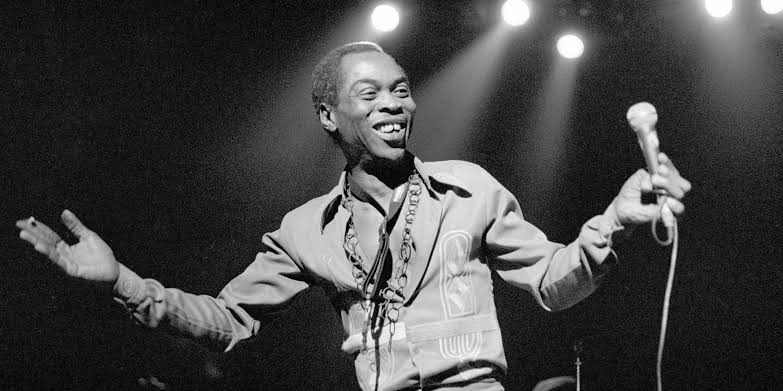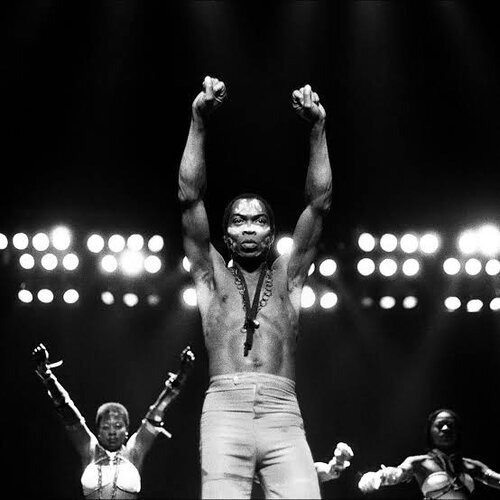
Fela Aníkúlápó Kútì (born Olufela Olusegun Oludotun Ransome-Kuti; 15 October 1938 – 2 August 1997), was a Nigerian musician, bandleader, composer, political activist, and Pan-Africanist.
Fela Kuti is widely credited as the creator of Afrobeat in the early 1970s, which rapidly became the most avidly followed style across West Africa and beyond, he began his career playing jazz and highlife. He formed his first band in London in 1959 while studying at Trinity College of Music.
Known as the iconic, legendary Afrobeats maestro, Fela Kuti was also regarded as the King of Afrobeat, a Nigerian music genre that amalgamates West African music with African-American funk and jazz. At the glorious rise of his triumph he was regarded as one of Africa’s most “challenging and charismatic music performers,” he was outlined by AllMusic as “a musical and sociopolitical voice” of international significance.
Fela catapulted to stardom in Nigeria during the 1970s, during which he was an outspoken critic and target of Nigeria’s military troops. The same year, he founded the Kalakuta Republic commune, which declared itself independent from military rule.
After being jailed in 1984 and released after 20 months, Kuti continued to record and perform through the 1980s and 1990s. Since he died in 1997, compilations of his music have been overseen by his son, Femi Kuti. Fela Kuti was the son of Nigerian women’s rights activist Funmilayo Ransome-Kuti.
Kuti’s band was notable for featuring two baritone saxophones when most groups only used one. This is a common technique in African and African-influenced musical styles and can be seen in funk and hip-hop. His bands sometimes performed with two bassists at the same time both playing interlocking melodies and rhythms. There were always two or more guitarists. The electric West African style guitar in Afrobeat bands is a key part of the sound and is used to give basic structure, playing a repeating chordal/melodic statement, riff, or groove.
Some elements often present in Kuti’s music are the call-and-response within the chorus and figurative but simple lyrics. His songs were also very long, at least 10–15 minutes in length, and many reached 20 or 30 minutes, while some unreleased tracks would last up to 45 minutes when performed live. Their length was one of many reasons that his music never reached a substantial degree of popularity outside Africa.
The main theme he conveyed through his music was the search for justice through the exploration of political and social topics that affected the common people.
Without further ado, we bring to you a well-curated list of Fela Kuti’s Songs of All Time, catch the vibes below!
1. Zombie
Released in 1977, ‘Zombie’ is a classic Afrobeats anthem that transcends a powerful political message. Zombie is a song that tackles and makes jest of the herd mentality in the average post-colonial African man.
Furthermore, it is also one of Fela’s most sampled and incorporated songs with extant artists such as Wizkid and Burna Boy following the same style.
2. Coffin for Head of State
Another powerful political anthem is ‘Coffin for Head of State’ a sorrowful song for vengeance, a song that he wrote after his mother’s death. The military state reportedly threw his mother from a second-floor window which caused a fractured leg, and lasting trauma, this trauma led to her early demise. On this record, Fela calls for the head of state to be placed in a coffin, very much like the head of state placed his mother in a coffin.
3. Lady
Lady was released in 1972, the song narrates the pride of an African woman, as the line narrates, “If you call am woman, African woman no go gree, she go say I be lady oh”. The record found its way into the nitty gritty of modern Afrobeats songs. Before Wizkid, Tiwa Savage, and the likes said those words, Fela had vocalized it in his 1972 hit track ‘Lady.’
4. It’s Highlife Time
Before delving into the heavy jazz and funk‐infused Afrobeat sound that made him famous, Fela Kuti fronted a highlife band called Koola Lobitos. “It’s Highlife Time’ was delivered with his musical band, Koola Lobitos. The melody is a perfect example of Fela’s outspoken political anthems. A sprightly, danceable tune with a fun little melody, the track finds Kuti singing lines such as “I jump for joy!”
5. Let’s Start
Performed live on stage, Cream drummer Ginger Baker headed to Nigeria in the early ’70s, driven by his interest in the country’s music, and as a result, he recorded or released a handful of records by Nigerian artists. In 1971, he even performed with Fela Kuti’s Africa 70, sitting in for drummer Tony Allen, and on “Let’s Start,” the leadoff track to the album that resulted from the sessions, Baker provides a solid backing for the group’s deep funk, which actually is one of the more rock-oriented tracks they recorded, thanks in large part to the fuzz guitar riff that drives the song.
6. Water No Get Enemy
From the ‘Expensive Shit’ Album released in 1975, the anthem up to date remains an anthem in the mouth of its lovers and Fela’s devotees. It’s a major component of anything having to do with Afrobeat or conscious music. “Water No Get Enemy” reveals a different side of Kuti’s musical persona, it also shows more diversity in his approach. Stunning stuff. ‘Water No Get Enemy’ is one of Abami Eda’s greatest hits without a doubt, a song that has been chorused and lauded by generations.
7. Gentleman
Hailing from the ‘Gentleman’ Album, the record “Gentleman” is just as notable for its criticism of post-colonial Africa and the lasting influence that the English had on the region. He sings, “I no be gentleman like that/ I be Africa man original.” Gentleman was released in 1973 under the studio album with the same title. The song has been sampled by various musicians including American hip-hop artist J. Cole.
8. My Lady Frustration
Fela’s musical awakening happened over several years and in a handful of countries. After learning his chops in the UK, he started formulating his own sound while gigging in Ghana and Nigeria. But things really started to take shape during an otherwise ill-starred tour of America in 1969. It was during a stop at Los Angeles that he first met Sandra Smith, an African-American civil rights activist who had spent three months in jail after assaulting a police officer at a Black Panthers rally. It was through meeting her that he first began to think in an Afro-conscious way. As he told the journalist Carlos Moore:
“Sandra gave me the education I wanted. She was the one who opened my eyes … She talked to me about politics, history … she blew my mind really.”
While reading her copy of Malcolm X’s autobiography he realised that he wanted to play African music, and the “Fela Kuti sound” was finally born. Towards the end of his elongated American misadventure, he debuted “My Lady Frustration” in a nightclub.
9. Ye Ye De Smell
The track, Ye Ye De Smell was released live with the Africa ’70 and Ginger Baker. Fela Kuti was playing with his Koola Lobitos in London’s Flamingo Club in the mid-60s when he first met Ginger Baker. The pair got on and when the drummer flew out to Lagos in 1970 and heard Afrobeat playing on Nigerian radio, he decided to hook up with the horn player.
Later that year Baker flew back to London with Kuti and his group, Africa 70. They played a collaborative gig at Abbey Road in front of 150 guests which would get released by EMI Nigeria as Live!.
10. Roforofo Fight
By 1972, Fela Kuti had released a pretty good amount of material, though ‘Roforofo Fight’ was the beginning of his peak years in creativity, one of the first of a long string of masterpieces. Fela begins by dropping some spoken word chants over its upbeat rhythm, but within a couple minutes comes a blast of mighty horns, bass and hypnotic keyboards.
In 1970 he formed a commune called the Kalakuta Republic and set up a recording studio. He also founded a nightclub in the Empire Hotel, changing the name from the Afro-Spot to The Shrine in 1971. His fame grew and he used his platform at The Shrine to promote resistance to dictatorship and pan-African socialism. He also awarded himself a new name, Anikulapo, which translates as “the one who carries death in his quiver”, to replace his colonial or slave name.
11. No Agreement
“No Agreement” was delivered in 1977 by Fela Kuti with the Africa 70 band. The song hails from the album with the same name. In ‘No Agreement,’ Fela divulges his refusal to kowtow in the face of injustice.
No Agreement is not only Fela Kuti’s best track but also one of the greatest pieces of dance music ever recorded.
12. Africa Centre of the World
Coming from the ‘Music of Many Colors’ album released in 1980, it’s a loose-limbed funk banger but also feels analogous to a techno track.
By the early 1980s, Fela Kuti was fully engaged in a spiritual project to make himself completely invulnerable to death by the use of both traditional and newly invented magic rituals. His new belief system included spiritually bulletproof cloaks, UFO contact and chicken sacrifice. Paranoia and confusion became the order of the day among his inner circle.
By the late 80s, he had rejected the term Afrobeat, preferring to think of his work as African classical music and his output became less ecstatic.
13. Expensive Shit
Fela’s Expensive shit was released in 1975 under his twelfth studio album with the same title. The song talks about the fabricated lies and propaganda hurled at him by the government in power.
The military police in Nigeria were notorious for raiding Fela’s compound, the Kalakuta Republic, on regular basis, trying to find different ways to trump up charges against Fela. At one point, when they broke into the compound, they gathered up specimens of shit to inspect for traces of marijuana to try to find a charge. So ‘Expensive Shit’ is based on that story. Later, when he was in jail, they waited for him to use the bathroom so they could test his shit as well.
14. I.T.T (International Thief Thief)
In a situation of universal law, Fela’s ballads spoke to the negative actions of the colonizers. How all the colonizers across Africa always came, took what they could and ran off with it, without ever really truly paying for it.
In this tune, Fela clearly identifies and addresses “globalisation” as a problem for countries throughout Africa. He sets out the MO used by “multinationals” when they set up in developing nations (with the collusion of corrupt officials) – all done with the clever use of metaphors. Note that this tune was released way back in the ’70s, long before those terms crept into contemporary usage as bywords for corporate greed and inhumanity. Epic sometin.
15. Fogo Fogo
“Fogo Fogo” is a classic Afrobeat song by Fela Kuti, released in 1971. The song’s title means “Fire Fire” in Portuguese. Fela’s vocals are energetic and soulful, and the song’s instrumentation features layers of horns, percussion, and guitar. “Fogo Fogo” is a celebration of life and joy.
16. 2000 Blacks Got to Be Free
Seeking for freedom, Kuti collaborated with Roy Ayers. They were talking about how in the year 2000 all black people should be free. They thought towards the future and, even in the post-civil rights era in which Africans and African-Americans had a closer relationship, and there were all these laws created that gave black people a little more freedom in the United States, they were still not truly free.
17. Look and Laugh
The muscularity of the groove only properly asserts itself for brief moments during the track, as befits musicians who truly understand the concept of delayed gratification. It’s a rough and ready recording and a glorious track. The Afrobeat sound Kuti developed with Roy Ayers found its strength through diversity.
Perhaps his greatest piece, but so hard to choose right, there is something so spiritual about this melody Fela must have met an alien to put this all together.
18. V.I.P. (Vagabonds in Power)
V.I.P was recorded live in Berlin at the Jazz Festival in autumn. The song renders its lyrically exalted attacks on the abuse of state power. The album straddles the cusp of the break-up of Afrika 70 immediately following the Berlin visit and the formation of Egypt 80 in 1979.
19. Original Sufferhead
In 1981s, ‘Original Sufferhead’ was the first album which Fela officially credited to Egypt 80 rather than Afrika 70. In late 1978, following an appearance at the Jazz Festival, Afrika 70 had disintegrated. Bandleader and drummer, Tony Allen who had been with Fela since 1964, quit with most other members.
20. Eko Ile
While Fela has been described as Nigeria’s answer to James Brown, a good portion of Kuti’s music didn’t necessarily sound all that much like that of the American funk pioneer. However, on Afrodisiac, one of the rare Kuti albums that features tracks well under ten minutes long, he and his band actually hit a deep groove strongly reminiscent of the J.B.’s. “Eko Ile,” spanning only six and a half minutes, is a catchy, vibrant tune that finds Kuti at his funkiest. Maybe not his most adventurous work, but certainly a great starting place for newbies to segue into Afrobeat.
21. Fight to Finish
From his London Scene in 1971. ‘Fela’s London Scene’ was Fela’s first album with Band Africa 70, and is largely considered to be the first ever Afrobeat album. It’s simpler and more based in funk than many of his later releases, and for that matter, less expansive in duration. Yet, it’s an explosive and exciting piece of music, thoroughly soulful and masterfully played. The back-and-forth between the guitar and horns is something quite stunning. It was really only an early stage in his long career of artistic growth and innovation, but an impressive one nonetheless.
22. O.D.O.O. (Overtake Don Overtake)
“O.D.O.O.” is a one-track album, originally released in 1990, with another long-form lyric. In it, Fela decries the common practice of the Nigerian police and military of shaking down innocent citizens for supposed traffic offences, imposing instant “fines.”
23. Sorrow Tears and Blood
“Sorrow Tears and Blood” is one of Fela’s many introspective numbers. The song was recorded in 1977 by Fela and his Afrika 70 Band. The song talks about the crippling effects of mass genocide.
24. Beasts of No Nation
Released in 1989 but written in 1986, “Beasts of No Nation” is the first song Fela wrote after serving two years of a five-year jail sentence. Fela Kuti’s ‘Beast Of No Nation’ is an unapologetic mockery of the failed Nigerian system of Government. In the song, Fela called out the corrupt practices of so-called Nigerian leaders in power with comical yet subliminal lines such as “Animal in human skin, animal dey wear agbada”.
25. Shakara
Shakara is a witty satire aimed at the modern-day African woman who took pride in painting a facade of character by playing hard to get or exhibiting a fake lifestyle as opposed to being true and original. Fela was an avid storyteller and this song was/Is an interesting story.
26. Confusion Break Bones (C.B.B.)
Many music crooners have drawn the conclusion that Afrobeats sounds all the same, but Fela clears their ignorance. C.B.B. is a calming, melodious and well-orchestrated tune, having Kuti transform the aura of his listeners, as he also renders harmonious tunes and beats with his instruments.
27. Colonial Mentality
‘Colonial Mentality’ was written and performed by Fela and the Afrika 70 Band in 1977. It was the second side of Fela’s 1977 album ‘Sorrow Tears and Blood.’ He wrote the record following the South African apartheid regime’s murderous crushing of the Soweto uprising of 16 June 1976. That lyric is among the most moving Fela wrote, and “Colonial Mentality” is among the most acerbic.
The song is a wake-up call to Africans who saw themselves as superior to other Black people simply because they lingered on to Western practices, and norms despite liberation from the British Western colonies.
28. Shuffering and Shmiling
Shuffering and Shmiling is a song that speaks about the current and sad reality of Nigerians living in Nigeria. Sadly, the song still holds its essence the same way it did when Fela wrote and performed it in 1977.
The masterpiece includes some of his most fiercely anti-religious lyrics which are explicitly anti-Christian and anti-Islamic. The single was banned by the Nigerian Broadcasting Corporation.
29. Upside Down
Another one of the most beautiful protest songs in the world. It talks about how all these other races and countries of people get their own names and their own denominations, but the African is always forced to follow the names of the colonizers.
The most incredible thing about it is that the vocalist of the tune is a woman by the name of Sandra Izsadore, who’s an American. She basically left America with Fela when he came to Los Angeles, became one of his wives, and ended up becoming the lead vocalist for this tune.
30. Trouble Sleep Yanga Wake Am
Yet, another popular anthem up to date, “Trouble Sleep Yanga Wake Am” is another captivating storytelling track which also catapulted Fela’s fame following its viral acceptance. With the song he narrated a series of events, and the song deserves a spot in Fela’s Greatest Song Hall of Fame for sure.
31. Yellow Fever
Yellow Fever is thrown at African Women who are accustomed to skin bleaching. In the record, Fela Kuti humorously warns against the dangerous aftermaths of artificial pigmentation of the skin.
It is one of Fela’s greatest masterpieces. It is sung in Broken English, the language Fela adopted in other to make his words understood beyond Yoruba speakers, making his message comprehensible through Anglophone West Africa.
32. Who No Know Go Know
As the title depicts, you can already imagine what this track would sound like. “Who No Know Go Know” is a Fela classic released from the 1975 “Everything Scatter” album.
33. Question Jam Answer
Question Jam Answer is about a back-and-forth in Fela’s mind and he delivers a brilliant performance on the song.
34. Gbagada Gbagada Gbogodo Gbogodo
On ‘Gbagada Gbagada Gbogodo Gbogodo’ Fela delivered a soothing blend of Nigerian folk music and Jazz. The song’s theme is derived from beer parlour camaraderie.
35. Ololufe
Before Fela pioneered Afrobeat, he was into Highlife and one of his earliest renditions with his Koola Lobitus band was a song titled ‘Ololufe’. Ololufe is a beautiful ballad that blends Jazz, Soul music, and Highlife. It was released in 1963.
Aside from these aforementioned hit records, Legendary Fela Kuti has more hit songs, like, Teacher Don’t Teach Me Nonsense, Everything Scatter, Kalakuta Show, and lots more.
Fela’s legacy lives on still, through his family.




So great and historic!